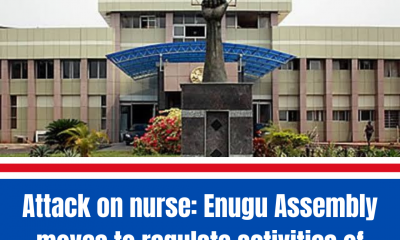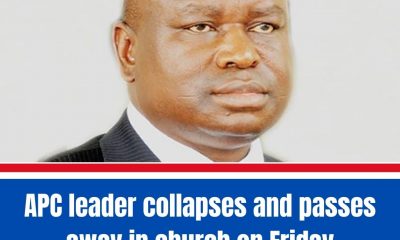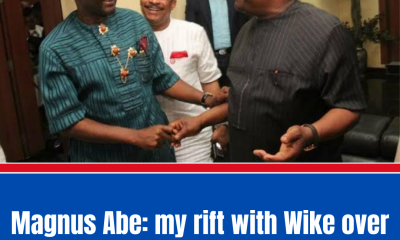Editorial
Abia @29: Politics of equity resonates

On August 27, Abia State marked 29 years of its creation. But beneath theg
veneer of celebration and self-adulation was pervading disappointment and cynicism. IGBEAKU ORJI reports
Abia State was carved out of Imo State in 1991 just like Anambra was cut out of old Anambra State but retained the old name. Enugu, the former capital became a new state with the old capital. So, it is the new Anambra State that is the contemporary of Abia State.
While the state celebrated, many were, however, lost in the search for a proper handle to the subject matter not because of lack of appropriate diction or expression of the state of affairs in the state but how to objectively situate the dawdle and desultory attitude to governance that has kept Abia behind its peers in all ramifications.
The reason for the backwardness of Abia State in almost all indices of development has baffled analysts. Some have dared to situate Abia’s administrative misfortune on the absence of a basic primer of leadership by those who have found themselves in the commanding heights of administration and the misleading perception that such individuals are infallible and above mistake.
So, anyone who happens to be part of the government at any level does not see the privilege as a rare opportunity to serve; to carve a niche for himself and posterity; but for personal aggrandizement.
Those who are privileged to lead Abia State seem to fortuitously stumble on the role of leading the state, without adequate preparation for the challenges or primed for the responsibilities inherent in the office. With neither a guiding agenda nor a road map, they do not have a simple development blueprint on which their own or future administrations can drive the aspirations of the people.
They seem to come without focus and appear easily overwhelmed by the sheer reality of governance. Everything is obtuse and obfuscated in inept administrative insouciance. The result is that in the comity of states of its age, Abia has fared worst. Anambra, to cite a next door example, was created the same day with Abia. Just like Umuahia, Awka was an old provincial capital before it assumed the new status of a state capital.
In fact, Awka was not as much a town as Umuahia prior to becoming the capital of Anambra State. It did not have planned streets as Umuahia had but was an old traditional town with flashes of modernity. At creation Awka had only two major roads, the Enugu-Onitsha expressway and the old road, which ran through the center of Awka.
Workers found it difficult to relocate from Enugu because there was no accommodation in Awka. The first military administrator of Anambra State, Navy Captain Joseph Abulu, had his office in the present Government House donated by the Anglican Bishop of Awka, Maxwell Anikwenwa, for the young state, while the governor’s lodge was in Amawbia.
Today, Anambra has conquered its infrastructural challenges, placing the state ahead of others with the highest per capita income. It has become the envy of others. It is difficult to differentiate the local government area and community boundaries as the good network of roads has transformed the state into one big community. Naturally, investments and other levels of development follow such enabling environment to complement government efforts.
Anambra achieved the feat by focused leadership and prudent management of resources, not with oil or derivation fund. Anambra is not in the league of oil producing states but Abia is. Like Abia too, Anambra inherited a huge work force. But it does not owe anyone, worker or pensioner either in monthly pensions or gratuity. Anambra has made itself the pride of Ndigbo and an example of the potential of component states attainment in a federation with a goal driven leadership.
Ebonyi, the youngest state in the South-East, was created in October 1996. Part of Ebonyi was in Abia State which is the reason Dr. Ogbonnaya Onu, the present Minister of Science and Technology, was the first elected governor of Abia State.
Four local government areas were cut from Abia to add to the nine from Enugu to create Ebonyi State. But today everyone is a witness to the multi sectoral transformation in Ebonyi State. Not a few have marvelled at the images and scenes of Abakaliki, the state capital.
The feat did not fall from the sky nor did it take rocket science to achieve. It is interesting to know that Ebony is not an oil producing state. All the markets in Ebonyi State put together are still smaller than one market in Aba.
While Abia State government has been struggling to complete one flyover in Osisioma junction Aba, Ebonyi has built six flyovers, not to talk of the solid road network across all sections the state. It is noteworthy that the present Ebonyi State government came to office at the same time with its Abia counterpart.
Apologists of the Abia government are quick to point to the advantages Ebonyi has, which include fewer workforce and the consequential overhead cost. By using such yardstick, they inadvertently mock Abia. Like Abia, Ebonyi is a Peoples Democratic Party (PDP) state; it has no advantage over Abia except in leadership style and priorities.
If anything, Abia has all the advantages. It has oil revenue, it has more local government areas with the attendant revenue allocation; it has one of the most viable internally generated revenue potentials, it has the rubber, cashew and palm plantations, which are revenue sources. The State also inherited the Aba Glass and Textile industries, Ceramic, Golden Guinea Breweries and the Ogwe Golden Chicken, just to mention a few.
Commenting on the state of affairs in Abia during the 29th anniversary, elder statesman and one of the founding fathers of the State, Ezeogo Dr. Anagha Ezeikpe, described the condition of Umuahia as shameful and embarrassing in 29 years as state capital.
“Abia has not done well; Umuahia does not look like a state capital,” he said. It is gratifying that the remark came from no less a personality than the chair of Abia State Advisory Council otherwise cudgels would fly from different directions in defence of the obvious hiatus that has further alienated the people.
The question many are asking is: What has successive administrations been doing after the brief stint of the first military administrator, Air Commander Frank Ajobena or in fact, the entire military era. It is incontrovertible that bad roads welcome one to Abia State from any entry point. Without any sign, bumpy roads announce entry into Abia State.
Many are of the view that the principle of equity conceived by the founding fathers to assuage the envisaged feeling of marginalisation and domination of any part of the state against others is ironically the undoing of Abia.
Based on equity, people tend to excuse failure with the illogical conclusion that an Umuahia man will build Umuahia, while Aba man will build Aba. In the end, Abia suffers as no part is eventually built.
There were high expectations that the status and physical and aesthetic outlook of Umuahia would dramatically transform in the immediate past administration because the then governor is a son of the soil. But Umuahia unfortunately, missed the opportunity.
Now, one wonders whether the Aba man will build Umuahia when its own son failed to do so.
The last time Abia had the semblance of even development was during the administration of Dr. Orji Uzor Kalu. He was able to touch all sections of the state with infrastructure and social amenity. But after he left government house, all his legacies were left in disrepair ostensibly to discredit him as a result of the ensuing political acrimony.
The intervening years were years of deterioration and dilapidation. The stride made in infrastructure was left to decay as there was neither maintenance of the existing ones nor new ones built to replace them. It is sad that after 29 years, Abia is still groping in the alley of basic infrastructural challenges.
But, it will be uncharitable to heap the refuse of cavalier administrative approach on the door of the incumbent governor, Dr Okezie Ikpeazu. The abysmal state of affairs is the result of years of neglect and failure to add to the building blocks of sustainable development.
But at the same time, Ikpeazu cannot be completely exonerated being the man on the saddle at the moment. He admitted at inception that government is a continuum. He inherited both assets and liabilities. He is doing his best to rewrite the sad narrative, but because of the overwhelming task his efforts seem like a pinch of salt in the ocean.
The problem of Aba is multipronged. The war to recover the city must be waged not only in the area of road construction and rehabilitation but also on filth and flooding. The governor has justifiably paid disproportionate attention to Aba.
The result is that Umuahia, the state capital has the outlook of a derelict quarter. It took more than four years, for instance, to rehabilitate the 5km Aba road and the 500 metres Afor Ibeji, Old Umuahia, which undoubtedly are the only major road rehabilitation work undertaken by the administration in the capital city. The patchwork on the roads have been abandoned leaving the cut and asphalt bare portions of the roads worse than they were.
The asphalt resurfacing of some roads in Umuahia, including Aba road has been abandoned. It is difficult to believe that Umuahia is a state capital. The streets are filled with potholes and over grown with grass.
The drainages are covered with silt and filth. When effort is made to scoop the debris, they are half-hearted. The scum is left on the side of the road to fall back after some time. Nothing seems to get the attention of government except the collection of taxes and levies. It gives one the picture of a decrepit junk yard of desolation.
The road that leads to the corporate headquarters of ASOPADEC in Umuahia is so deplorable that one wonders whether to use pontoon or swim across, yet the commission at the inauguration of the new office complex distributed brand new Lexus SUVs to its commissioners and others.
The roads Ikpeazu inherited from his predecessor and the ones he inaugurated are yet to be completed, especially in Abia North, more than five years into his administration.
The Abam-Arochukwu road, which its bridge was made a sing song, has remained impassable that even the governor himself will go to Arochukwu through Akwa Ibom State.
Till date, the people of Abam community go through Ohafia, which is another local government area to get to their local government headquarters in Arochukwu. Rather than complete ongoing road projects, the government recently announced the commencement of rehabilitation of 19 new ones, which are yet to take off several months after.
Ikpeazu has never complained of paucity of funds. Abia is rich. As one of the oil producing states, it benefits from the 13 per cent derivation fund aside from the monthly federal allocation. Aba has the largest markets in the South-East outside Onitsha. Yet the state is owing teachers, local government employees, tertiary institutions and parastatals.
Recently, staff of the Abia Polytechnic, Aba, threatened to take the governor to the National Human Rights Commission for salary arrears of 30 months. The story of the Abia State University Teaching Hospital (ABSUTH), Aba, is not different. They have endured without salary for close to three years.
The salary payment of staff of the Health Management Board (HMB) has remained embarrassingly intractable just as the College of Education (Technical) Arochukwu is a sad commentary. Local government workers are not up to date in salary payment, not to talk of the minimum wage. Also, secondary school teachers are not only owed salaries but also leave allowances.
To think that the present scenario subsists with the Federal Government bailout fund is irreconcilable. Just recently, the state commissioner for Finance, Dr Aham Uko, was a guest of a local radio station, where he absolved the state of culpability in the delay, illegal deductions and manipulation of salaries of council workers but to many, he was unconvincing.
Uko said the councils were autonomous; that they receive their allocations directly from the federation account and are free to spend the way to choose. That is not the whole truth. Who does not know that the transition committee chairmen are appointed by the governor and can be so removed?
Can any transition chairman satisfy his conscience, for those who have, even if he feels otherwise, without breaching the code of his appointment? Or is the commissioner saying that the governor has lost control of officials he appointed.
Assuming the cry of the workers that they are behind in salary (about three months), have not been paid the new minimum wage, stopped being paid leave grant and promotion arrears for several years, is true, who takes the blame, a local government transition chairman, whose tenure is as transient as the title and at the instance of the governor, or the governor?
A governor who will overlook damage to his reputation will not serve the people well. Is it the transition chairmen that decide what they and other political appointees get at the council level?
If so, why then do we not have any project being executed by any of them, except perhaps office renovation and such minor repair works and the state government will let them be with the monthly receipt that runs into millions of naira and their workers in arrears of salary?
Will the respective council unions let their chairmen go with their minimum wage, promotion arrears and leave grant running into months and years and the state government will look the other way?
It is not possible. Pundits have cited the expansion of the State Executive Council and numerous other appointments as reason for insisting that Governor Ikpeazu does not have the challenge of fund. They argued that if the government did not have enough resources, it will not embark on creation of new ministries at a time it should cut down the bulk of the humongous governance structure and strengthen existing ones to achieve result.
The new ministries, their commissioners and permanent secretaries would have to be paid. Appointment of permanent secretaries, even some without portfolios, continues on a regular basis. Just recently, the government announced a cut in the remuneration of government appointees indicating that it is in financial strait but Abia has no reason to be short of funds given the huge revenue potential of Aba alone. It smacks of ineptitude to note that government lacks the strategy to harness its resources, unless it does not want to tell itself the truth.
Ask Mr. Peter Obi, the immediate past governor of Anambra State what he did in Onitsha to improve internally generated revenue, otherwise the present state of affairs makes it easy for the opposition to take the state. Among the infrastructure that defines the development trajectory of any state, road is at the lead. No state will underplay the critical role of road infrastructure if it is serious with sustainable development.
And no community feels the impact of governance if it has no road. Road infrastructure is capital intensive that it cannot be embarked on by communities yet it drives other development paradigms.
This explains why it appeared that Senator Theodore Orji as governor did not do much in spite of the signature projects like the civil service secretariat, government house, Abia Specialist Hospital and Diagnostic Centre, International Conference Center, State High Court complex, among other projects.
These are laudable projects, no doubt, but with little or no impact on the people. While some have contended that it is time to review the charter of equity to give opportunity to competent hands to steer the ship of development irrespective of section, there is no doubt that present administration in Abia State government should wake up and change the status quo in the years ahead and recover the state from the dangerous slide.
-

 News5 days ago
News5 days agoAttack on nurse: Enugu Assembly moves to regulate activities of masquerades
-

 News2 days ago
News2 days agoFake Reverend Sister Arrested With 38 Children
-

 Politics6 days ago
Politics6 days agoAPC leader collapses and passes away in church on Friday
-

 News6 days ago
News6 days agoCourt awards N10m damages against EFCC for ‘unlawful’ publication against Christ Embassy Pastor Miebi Bribena and wife
-

 News6 days ago
News6 days agoLocal Content, Local Fraud
-

 Politics7 days ago
Politics7 days agoHon. Dr Gentle Emelah inaugurated as commissioner of education,
-

 Gist16 hours ago
Gist16 hours agoMy Boss Used To ‘KNACK’ My Wife After Sending Me On A Mission, To The Extent She Got… – Ex-soldier
-

 Politics5 days ago
Politics5 days agoMagnus Abe: my rift with Wike over




